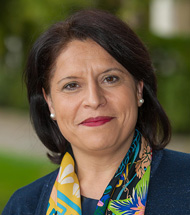"The Constitutional Law is our guarantee."
Asunción de la Iglesia, professor of Constitutional Law at the University, gave a session on the eve of the 41st anniversary of the Spanish Constitution.

Open, forward-looking, historically sensitive and accepting of ideological plurality. This is how Asunción de la Iglesia, professor of Constitutional Law at the University of Navarra, described the Spanish Constitution on the eve of its 41st anniversary. The lawyer gave a session entitled "Constitution and Open Democracy" organized by the cultural association Doble12 on December 5 at the Hotel Tres Reyes in Pamplona.
The lawyer listed the benefits of the Spanish Constitution, whose approval was "a revolutionary act", as it meant a break with the previous coexistence model of the country. She also highlighted the open nature of the document: "Everything was discussed," she explained. "It was discussed whether Spain would be a monarchy or a republic, individual freedoms and fundamental rights were discussed, and integration with Europe was discussed."
The Constitution turned Spain into an open democracy, in contrast to other European nations, such as Germany, which chose to declare themselves militant democracies after World War II. However, one of the consequences of the open system is the problem of governability, since the freedom of ideologies also implies accepting those contrary to the Constitution itself. De la Iglesia acknowledged that society is currently experiencing a moment of uncertainty and political fragmentation. Rather than Bauman's liquid society, she called it the "gaseous phase of society".
Despite these difficulties and the current criticisms of the Constitution, de la Iglesia encouraged the attendees to remember that, in its 41 years, the document has overcome complicated moments. It was born in 1978 with 87% support and ratified by the vote of 25 million Spaniards. It experienced European integration in 1993. It overcame the economic crisis of 2008 and now faces the explosion of populism, political crises and the crisis of the monarchy. De la Iglesia pointed out some of the challenges that the Constitution will have to overcome: an economic recession, a European crisis and the problems of secessionism in Spain.
Despite the current status , de la Iglesia remains optimistic. She pointed out that after the conflicts, the institutions and governing bodies have remained on their feet and that Spain, despite the difficulties, is still well positioned in world indices of democracy and the rule of law. After all, as the professor explained, managing an open democracy was more complicated than managing a closed one.
Quoting the words of Antonio Spadaro, the lawyer compared the Constitution to the mast to which Ulysses asked to be tied so as not to be seduced by the song of the sirens. "The Constitutional Law is the guarantee that we reach Ithaca," the lawyer said. "This one binds the power and protects it against the sirens' songs." Before a packed conference room , de la Iglesia concluded the session with a good omen for the future: "Bon voyage to Ithaca and happy Constitution Day".
